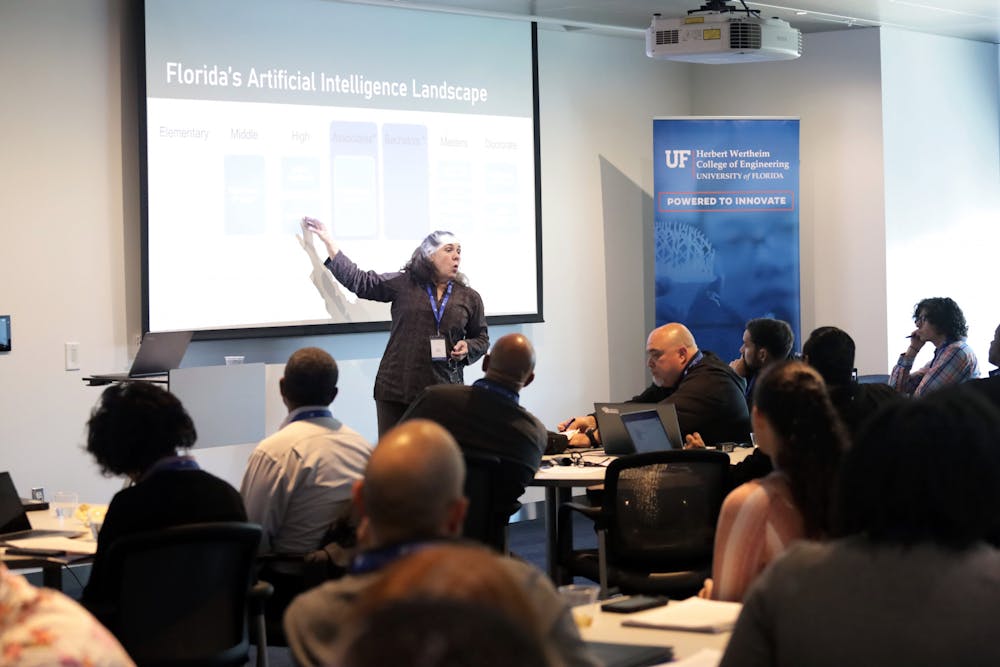Artificial intelligence is increasingly becoming the future of the workforce, and it may become the future of Florida’s K-12 classrooms as well — with UF’s help.
AI uses machine learning and knowledge, as opposed to the natural intelligence of humans. AI applications are becoming increasingly prevalent in careers and everyday life, said David Reed, UF’s associate provost for strategic initiatives.
“AI is a system of techniques that has — believe it or not — existed since the 1950s,” Reed said. “It’s old in terms of the way we think about AI, but its application has been revitalized in the past few years.”
The National Science Foundation’s program, Artificial Intelligence for K-12 Initiative or AI4K12, established guidelines for incorporating AI curriculum and knowledge into classrooms. The initiative inspired UF to implement its own AI curriculum into public schools. Florida teachers learn about AI fundamentals at UF-led professional development trainings.
The university currently has nearly $250,000 in state funding for AI professional development, said Nancy Ruzycki, a UF material science and engineering associate professor. UF’s funding for the program will run out next year once the current grant money runs out, she said.
“There's a need for continued funding to fund teachers and professional development beyond this,” Ruzycki said.
There are four courses under the AI initiative that UF is developing standards for. The first is AI in the World and the second is Applications of AI. The other two courses are still in development.
There are currently three teachers across Osceola, Orange and Broward counties who are teaching AI curriculum. The grant helps fund coaches who are specialized in the AI initiative and meet with teachers on a weekly or biweekly basis to discuss successes and obstacles in implementing AI into classrooms.
Sloan Robbins teaches the course AI in the World at Boyd H. Anderson High School in Lauderdale Lakes for students in ninth grade to 12th grade. The course observes AI in a general philosophical sense, he said, and his students are focusing on computer perception and creating smart electrical grids.
“AI is the future of where everything's heading,” Robbins said. “There's going to be some aspect that they're dealing with in really every career field across the board.”
Juan Tovar also teaches AI in the World at NeoCity Academy in Kissimmee. He used AI teaching in previous computer science courses and is currently teaching his students the fundamentals of programming while creating their own chatbots. His principal learned about UF’s AI initiative from Ruzycki. The principal reached out to Tovar to teach a class this semester.
“He told me, ‘Hey, this is a great idea to implement,’” Tovar said. “I think we can do that here, and we decided to implement that.”
UF coaches connect with Tovar and Robbins at least once every two weeks to monitor their progress teaching the courses. The next semester-long course that Robbins and Tovar plan on teaching, Applications of AI, focuses on AI across disciplines.
Coaches troubleshoot issues teachers face while implementing AI curriculum and ensure teachers thoroughly understand lessons.
“Our job is to help teachers teach materials so it’s more effective for students,” Ruzycki said.
UF held three-week-long boot camps, which hosted 11 school districts for AI professional development, over the summer in Miami-Dade, Osceola and Orange counties. The boot camps explained AI fundamentals and the purpose of the program.
The UF Herbert Wertheim College of Engineering hosted its own two-day symposium Oct. 19-20 that provided workshop sessions and resources to teachers from 27 Florida districts.
UF’s two-day symposium was funded through a separate grant and was open to teachers from across Florida. The state paid for 30 teachers to attend, while those in other districts applied and paid to have teachers attend.
Christina Gardner-McCune, a UF computer and information science and engineering associate professor who co-founded AI4K12, spoke at the event with about 45 teachers in attendance.
“My goal was to equip them with understanding where all the hidden places that AI might be in their everyday life — hidden in plain sight,” Gardner-McCune said.
Gardner-McCune said AI education needs to begin in the classroom.
“This is an opportunity to really spread AI across the state and make it accessible to our K-12 students,” Gardner-McCune said. “We are on the bleeding edge of this work that we’re doing as a state.”
Gardner-McCune developed the AI4K12 framework for four courses in Orange County about a year ago. After she went on sabbatical, UF worked with the state to update the framework, which prioritizes professional development opportunities for teachers.
“There is no teaching material out there for AI,” Ruzycki said. “We try to provide things that are more in line with the standards within the frameworks and build student literacy and competency for AI.”
The sessions aim to answer a central question, Ruzycki said.
“How can we push out a program to teachers when no one knows how to teach it — no one knows what it is?” Ruzycki asked.
Miami-Dade County teachers Alvaro Montes de Oca and Libni Simons said the experience was eye-opening. Montes de Oca teaches high school robotics and business application at Westland Hialeah High School in Hialeah, while Simons teaches seventh grade engineering and technology applications at John F. Kennedy Middle School in North Miami Beach.
“This is a great first step — to be here and get all of this information,” Montes de Oca said.
Simons also said he saw the value of the program.
“It’s not just robotics — it’s also from an agricultural point of view or from a cooking point of view,” Simons said. “It’s embedded in every topic.”
Contact Sophia Bailly at sbailly@alligator.org. Follow her on Twitter @sophia_bailly.
Sophia Bailly is the Fall 2024 University Editor. She interned for The Times-Picayune in Louisiana this past summer as a Capitol News Bureau reporter. When she's not reading the news, she can be found listening to podcasts, going for a run or studying Russian.






